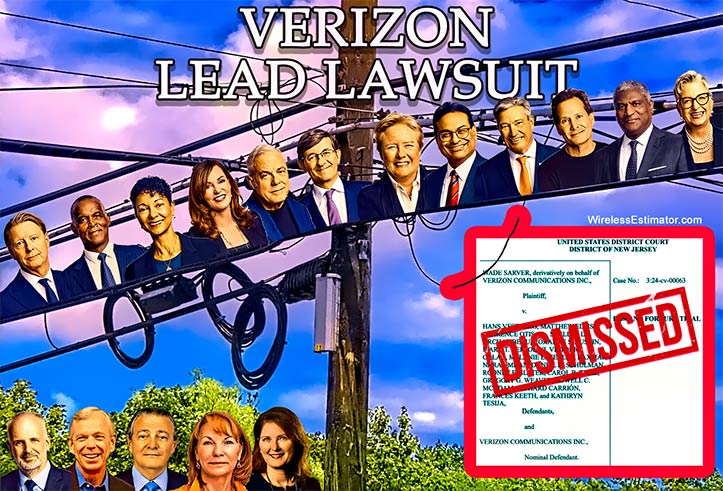
VERIZON CEO HANS VESTBERG (top, left) and his Board of Directors, including former executives and Board Members (below), are defendants in a lead-based lawsuit brought by Wade Sarver. Sarver said he was unaware of the filing and had the attorney who brought the lawsuit dismiss it within hours of learning about it from Wireless Estimator.
The same law firm that helped bring shareholder derivative class actions against AT&T and Verizon executives and board members last July for allegedly covering up their knowledge of abandoned toxic lead-laden telecom cables filed another suit in the U.S. District Court, District of New Jersey earlier this month on behalf of Verizon shareholder Wade Sarver against Verizon’s current Board of Directors and former executives and directors.
The 18 defendants had 21 days upon receipt of the summons to answer the complaint or to file a motion for summary judgment. However, they can thank Sarver since they will not have to expend many thousands of dollars in attorneys’ fees after he requested the Court to dismiss the complaint within hours of learning that the lawsuit had been filed.

The Rosen Law Firm filed a lawsuit last July against AT&T as well as Verizon, with the complaints relying heavily on investigatory articles about lead-based cables published by The Wall Street Journal. Similar allegations were presented this month in Sarver v. Vestberg.
Although the Court has not approved the request for dismissal as of this morning, it will likely be accepted since none of the defendants filed an answer or request for summary judgment.
In a derivative complaint, one or more shareholders act as plaintiffs on behalf of the corporation. The legal claim is not for damages or relief directly benefiting the shareholders but rather for the corporation’s benefit.
This type of lawsuit is brought when the shareholders believe that the corporation has a valid legal claim against officers and directors believed to have engaged in wrongful conduct that harmed the company.
If the lawsuit succeeds, damages or recoveries typically go to the corporation rather than the individual shareholders who initiated the suit. The goal is to compensate the corporation and not the plaintiffs for the harm suffered due to the alleged misconduct.
Press request ends with no lawsuit versus an expected no comment
The Rosen Law Firm of Newark, NJ, filed the complaint on January 4, 2024. On January 8, 2024, Wireless Estimator contacted Sarver for a comment regarding the lawsuit.
Sarver said he was unaware that it had been filed, and when Wireless Estimator sent him a copy of the complaint, he read it and was rendered speechless.
“I see where I DocuSigned the lawsuit on December 23, agreeing with it, but I wasn’t aware that I would be the sole person listed in the complaint. I thought I would just be one of many,” he said.
However, it could be understood why Sarver was confused since he had limited knowledge about lawsuits, primarily derivative actions, and a Rosen Law attorney had contacted him to be the plaintiff and provided minimal information.
According to Sarver, he had signed up on Rosen Law’s website last year as a stockholder to be part of their pending lawsuit against Verizon.
On December 18, 2023, Sarver was contacted by a Rosen Law attorney in an email stating: “We wanted to see if you are still holding any shares. If so, you may be able to seek additional remedies.”
Sarver, a subject matter expert in wireless infrastructure development, asked what the requirements were and was informed in an email that as a current shareholder, “…you can also pursue a remedy through a derivative action. The purpose of the case is to force the company to go after management that caused the company harm.”
The draft copy of the complaint that Sarver signed was changed considerably in the lawsuit filed. The draft didn’t show Sarver as the sole plaintiff and appeared to Sarver to be a template that others would sign, he said, since it listed that the plaintiff was a citizen of Connecticut, although he resides in Pennsylvania, he said.
In addition, Sarver noted the draft that he verified had five counts of alleged wrongful acts. The filed complaint had seven claims.
On January 8, 2024, Sarver informed Rosen Law that he wanted to withdraw the complaint because of the discrepancies between the two documents and because he appeared to be the lead plaintiff, which he never intended to be when verifying the draft.
Within two hours after the request, Rosen Law filed for dismissal.
A plaintiff must be capable of fairly and adequately protecting the interests of the corporation, a time-consuming requirement that conflicts with Rosen Law’s statement to Sarver: “…the time commitment is minimal. Things can be done by email, phone, or if need be video conference.”
The lawsuit, that is expected to be dismissed, draws on reporting from The Wall Street Journal asserting that lead-sheathed cables that Verizon inherited from Bell System are leaching lead into the environment.
It is unknown if Rosen Law will find another plaintiff and refile the lawsuit.
Rosen Law’s carrot to entice a plaintiff that was sent to Sarver was: “If the case is successful, we may be able to get you an incentive award if approved by the Court in the case. Incentive awards, if approved by the Court, can range between an extra $1000 (Sic) to $5,000 if approved by the Court.”
The defendants in the 64-page lawsuit are Hans Vestberg, Matthew Ellis, Clarence Otis, Jr, Shellye L. Archambeau, Roxanne S. Austin, Mark T. Bertolini, Vittorio Colao, Melanie L. Healey, Laxman Narasimhan, Daniel H. Schulman, Rodney E. Slater, Carol B. Tome, Gregory G. Weaver, Lowell C. McAdam, Richard Carrion, Frances Keeth, Kathryn Tesija, and Verizon Communications, Inc.


















